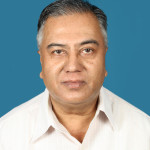 Chairman, Centre for Policy Studies, 6, Baliah Avenue, Luz, Mylapore, Chennai.
Chairman, Centre for Policy Studies, 6, Baliah Avenue, Luz, Mylapore, Chennai. - Theoretical Physics (Conceptual and Mathematical Foundations of Quantum Mechanics)
- History and Philosophy of Science (Scientific and Technological Tradition of India: Methodology of Indian Tradition of Science, Study of Source Texts of Indian Mathematics and Astronomy)
- Indian Society, Economy and Polity
Talk of the abstract
We shall present an introductory overview of development of science in India from ancient times to the modern period. We shall focus mainly on the disciplines of Mathematics and Astronomy, and only briefly touch upon other important disciplines such as Linguistics and Medicine. In all these disciplines, a high level of systematization was achieved at a fairly early stage and this was followed by significant developments all through the classical and the medieval periods. The Indian contributions have also had major impact on the development of sciences in other civilization areas.
Apart from highlighting such achievements, we shall also briefly discuss the foundational methodology of Indian sciences. Traditionally, such issues have been dealt with in the detailed bhashyas or commentaries, which continued to be written till recent times and played a vital role in the traditional scheme of learning. Here, we shall emphasize the pragmatic and open-ended approach to scientific theorization as expounded in the canonical scientific texts of India, which is strikingly different from the ideal of absolutely true universal laws which has dominated the Greco-European scientific tradition.
Readings
- The Indian Tradition in Science and Technology, an Overview – JK Bajaj (1988)
- The Algorithmic Approach of Indian Mathematics – MD Srinivas (2015)
- Kerala School of Astronomy and Mathematics – MD Srinivas (2012)
- On the Nature of Mathematics and Scientific Knowledge in Indian Tradition – MD Srinivas (2016)
Material for reference (optional reading):
- Development of Calculus in India – K Ramasubramanian & MD Srinivas (2010)
- Proofs in Indian Mathematics – MD Srinivas (2005)
- The Traditional Indian Planetary Model and its Revision by Nilakantha Somayaji – K Ramasubramanian, MD Srinivas & MS Sriram (2011)
Videos